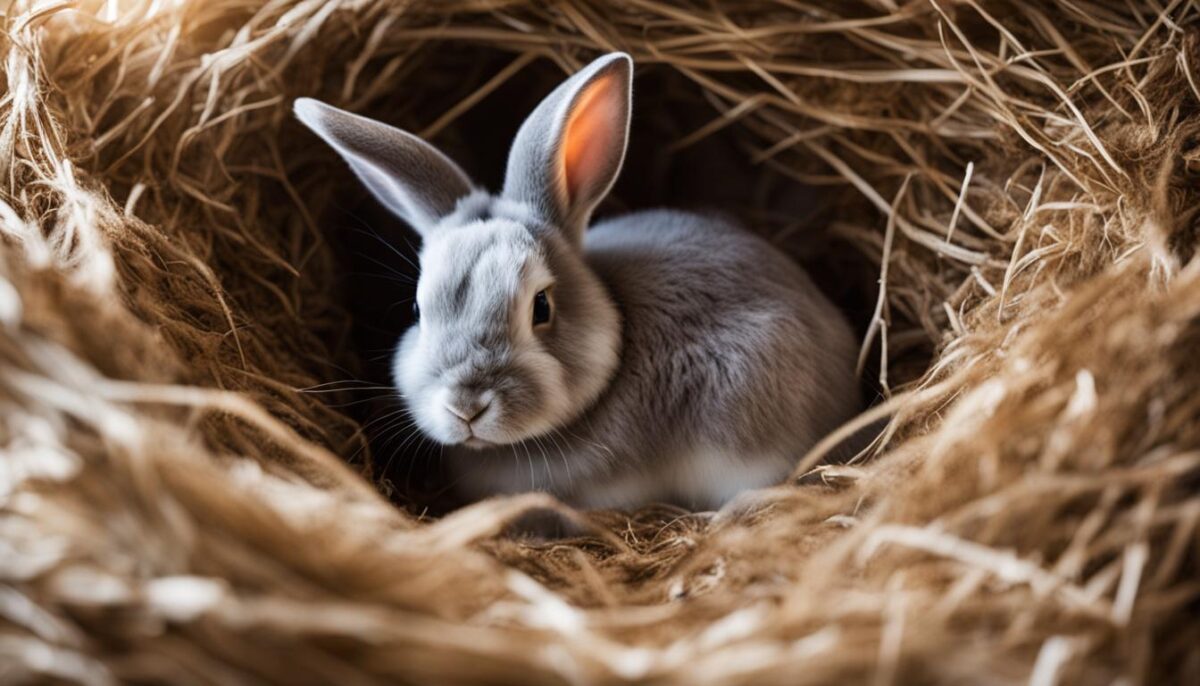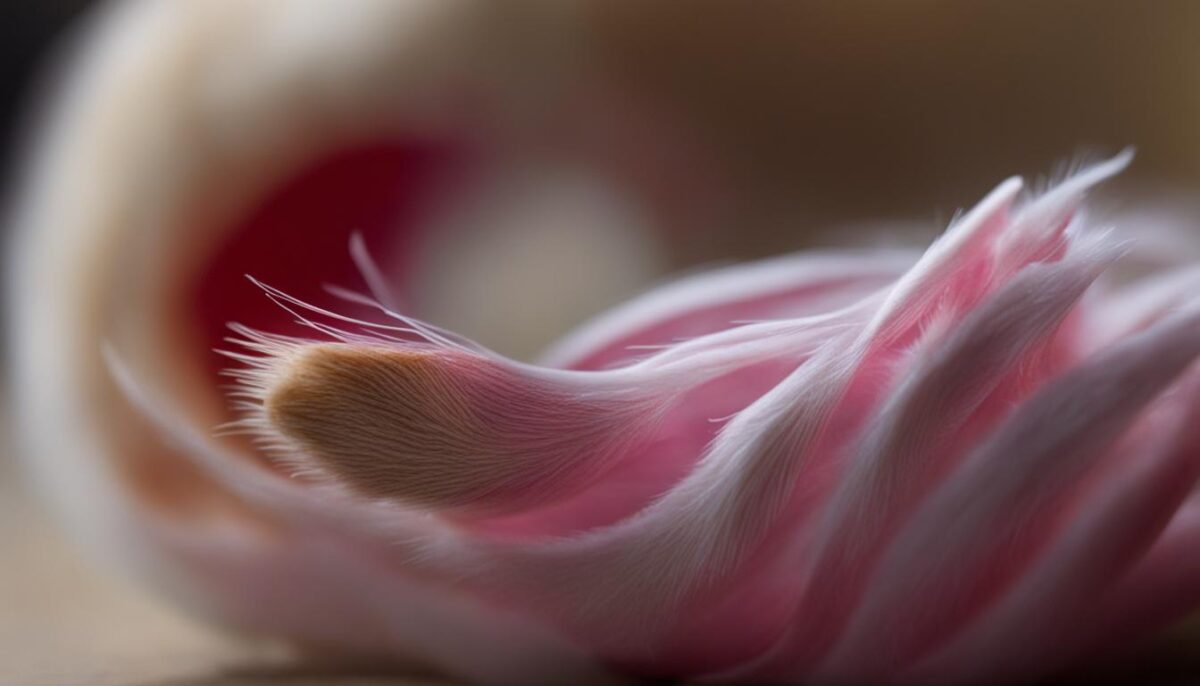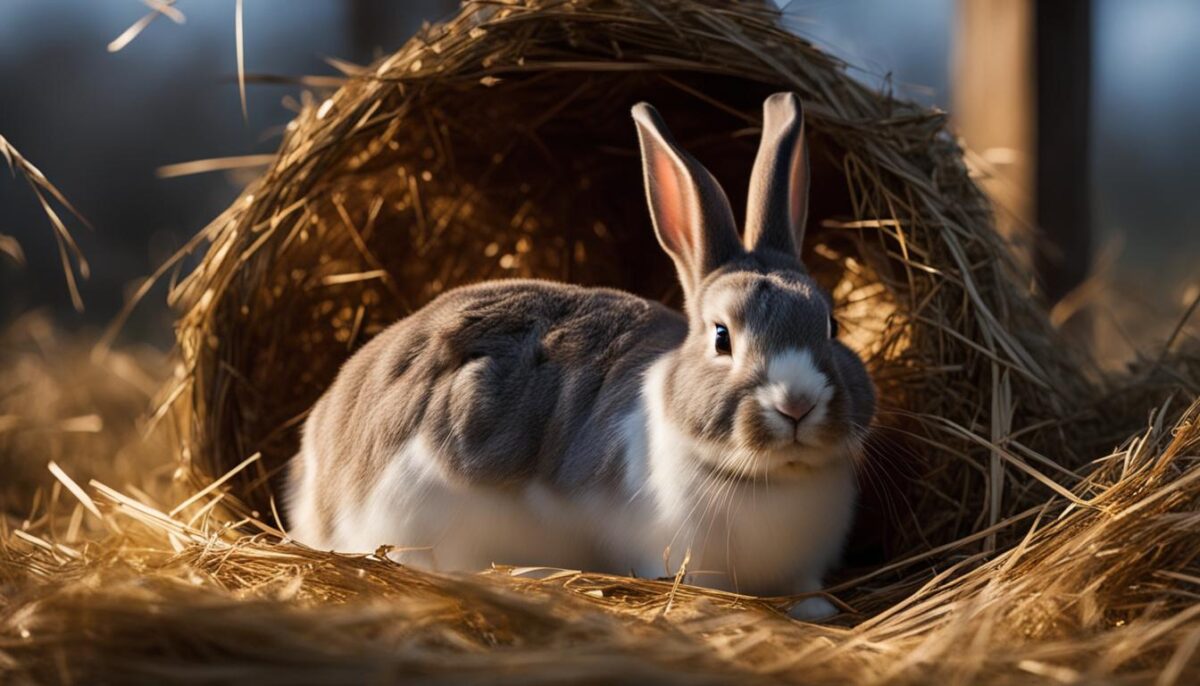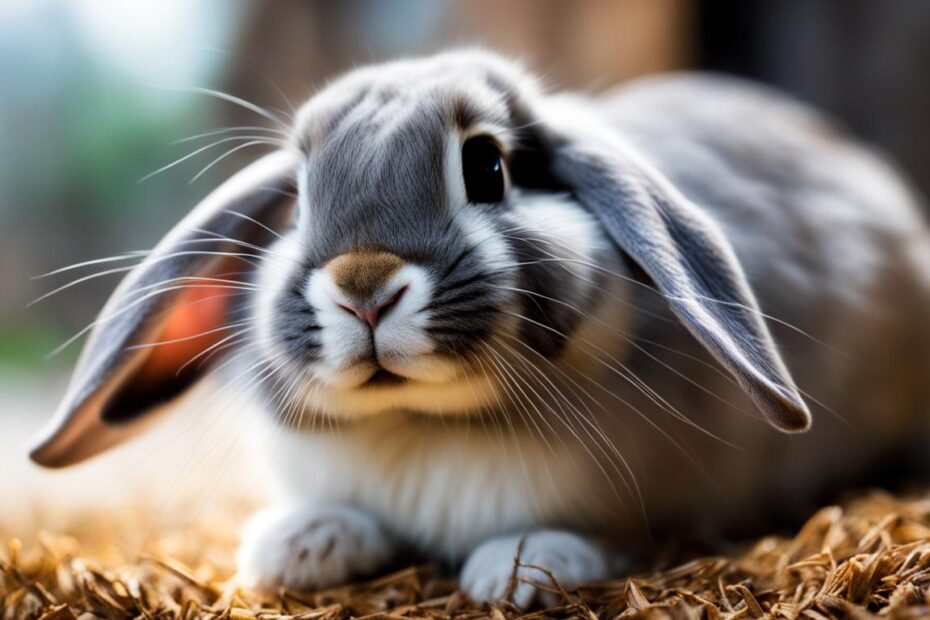If you have a pregnant rabbit, it’s important to be able to recognize the signs that she is in labour. By understanding these signs, you can provide the necessary care and support for your rabbit during this crucial time.
Some of the key signs that your rabbit might be in labour include weight gain, increased appetite, mood swings, nesting behavior, and the ability to feel the baby rabbits inside her belly. These signs can give you a clue that the birthing process is approaching.
However, if your pregnant rabbit has not given birth after 30 days, it’s important to consult a veterinarian for an examination. They can assess the situation and provide any necessary medical intervention if needed.
Preparing a comfortable nest box for your rabbit to give birth in is also crucial. Additionally, be prepared for the arrival of multiple baby rabbits, as rabbits can have litters of up to 15 babies.
Key Takeaways:
- Weight gain, increased appetite, mood swings, nesting behavior, and the ability to feel baby rabbits inside the belly are signs that your rabbit may be in labour.
- If your pregnant rabbit has not given birth after 30 days, consult a veterinarian for an examination.
- Provide a comfortable nest box for your rabbit to give birth in and be prepared for the arrival of multiple baby rabbits.
How to Determine if Your Rabbit is Pregnant
If you suspect that your rabbit may be pregnant, it is important to know the signs to confirm her condition. Unlike other animals, rabbits do not always have a visibly swollen belly during pregnancy, making it difficult to determine their pregnancy just by looking at them. The most reliable way to confirm pregnancy is through a veterinarian examination or by feeling for the baby rabbits inside the mother’s belly.
When assessing your rabbit’s pregnancy, it is best to consult with a veterinarian to get a conclusive diagnosis. They have the expertise to accurately determine whether your rabbit is pregnant or not. By relying on their professional assessment, you can ensure that your rabbit receives the appropriate care and attention throughout her pregnancy.
By understanding how to determine if your rabbit is pregnant, you can provide the necessary support and care for her well-being. A veterinarian examination is the most reliable method to confirm pregnancy, ensuring that you can prepare and make appropriate arrangements for the arrival of baby rabbits.
Stay tuned for our next section, where we will discuss the gestation period of rabbits and the signs of impending labor.
The Gestation Period of Rabbits
Pregnancy in rabbits, also known as the gestation period, typically lasts for about a month or approximately 31 days. It’s important for rabbit owners to be aware of this timeframe and monitor their pregnant rabbits closely as they approach the 31-day mark to look for signs of impending labor.
Some common signs that indicate a rabbit may be getting ready to give birth include nesting behavior, weight gain, and mood changes. As the due date approaches, the pregnant rabbit may exhibit increased nesting behavior, such as collecting bedding materials like hay and creating a comfortable space for the delivery of her babies.
In addition to nesting behavior, pregnant rabbits may also experience weight gain and mood changes. It’s crucial for rabbit owners to provide a suitable nest box for their rabbits and closely monitor their behavior as the due date approaches. This will help ensure a safe and comfortable environment for both the mother and her babies.
| Signs of Impending Rabbit Labor | Duration |
|---|---|
| Nesting behavior | Approximately 1 week before giving birth |
| Weight gain | Throughout pregnancy |
| Mood changes | Throughout pregnancy |
“The average gestation period for rabbits is around a month or 31 days. It is crucial for rabbit owners to closely monitor their pregnant rabbits and look for signs of impending labor, such as nesting behavior, weight gain, and mood changes.”
If a pregnant rabbit has not given birth after 35 days, it may be necessary to consult with a veterinarian for a medical induction. Veterinarians can provide expert guidance and help ensure the health and well-being of both the mother rabbit and her babies during the birthing process.
Nesting Behavior of Pregnant Rabbits
A common sign that a rabbit is preparing to give birth is nesting behavior. This behavior usually begins about a week before the rabbit is due to give birth. Nesting behavior can include collecting bedding materials, such as hay, and creating a comfortable space to give birth. Some rabbits may also pull out their fur to line the nest. It is important to provide a suitable nest box for your rabbit and to monitor her nesting behavior as the due date approaches.
Signs of Nesting Behavior
There are several signs that indicate a pregnant rabbit is exhibiting nesting behavior:
- Collecting bedding materials: Pregnant rabbits will gather hay, straw, or other soft materials to create a comfortable nest.
- Lining the nest: Some rabbits will pluck their own fur to line the nest, creating a warm and cozy space for the babies.
- Pawing and digging: Rabbits may dig at the bedding materials, rearranging them to their liking.
It is important to observe your pregnant rabbit closely for these signs of nesting behavior. Providing a suitable nest box can help satisfy her instinctual need to prepare for the arrival of her babies.

“Nesting behavior is a natural and important part of a rabbit’s reproductive cycle,” says Dr. Emily Johnson, a veterinarian specializing in small animal care.
“By creating a comfortable and secure nest, the mother rabbit can provide a safe environment for her newborns and ensure their survival. It is crucial for rabbit owners to understand and support this behavior during the pregnancy.”
Preparing a Nest Box
Creating a suitable nest box is essential for a pregnant rabbit to feel secure and comfortable during labor and birth. Here are some tips to help you prepare a nest box:
- Choose a spacious box: The nest box should be large enough for the mother to move around comfortably.
- Add bedding materials: Provide a layer of hay or straw as bedding for the nest.
- Place the box in a quiet area: Find a quiet and secluded spot for the nest box to minimize disturbances.
- Ensure privacy: Keep the nest box away from high-traffic areas and other pets to reduce stress for the mother rabbit.
By following these guidelines and closely monitoring your rabbit’s nesting behavior, you can help ensure a smooth and safe birthing experience for both the mother and her babies.
Table: Nesting Behavior Checklist
| Signs of Nesting Behavior | Observations |
|---|---|
| Collecting bedding materials | Rabbit gathers hay and straw |
| Lining the nest | Rabbit pulls out fur to line the nest |
| Pawing and digging | Rabbit digs at bedding materials |
The Importance of Proper Nutrition for Pregnant Rabbits
Pregnant rabbits have unique nutritional needs that must be met to ensure their health and the proper development of their babies. Providing the right diet during pregnancy is crucial for the overall well-being of the mother rabbit and the growth of her offspring.
One of the key aspects of proper nutrition for pregnant rabbits is offering an increased amount of fresh vegetables in their diet. Vegetables such as leafy greens, carrots, and bell peppers are rich in essential vitamins and minerals that support the health of both the mother and the babies.
In addition to vegetables, pregnant rabbits should have constant access to alfalfa hay. Alfalfa hay is higher in calcium and protein compared to grass hay, making it an ideal choice for supporting the rapid growth of the baby rabbits. It’s important to gradually transition the pregnant rabbit from grass hay to alfalfa hay to prevent any digestive issues.
It is also essential to ensure that the pregnant rabbit has access to fresh water at all times. Hydration is crucial for the proper functioning of the mother’s body and to support milk production once the babies are born.
| Nutritional Guidelines for Pregnant Rabbits |
|---|
| Offer a variety of fresh vegetables |
| Provide constant access to alfalfa hay |
| Gradually transition from grass hay to alfalfa hay |
| Ensure access to fresh water at all times |
By following these nutritional guidelines, you can help ensure the health and well-being of your pregnant rabbit and her babies. However, it’s always recommended to consult with a veterinarian for specific dietary recommendations based on your rabbit’s individual needs and condition.
Caring for Newborn Baby Rabbits
After your rabbit has given birth, it is important to provide proper care for the newborn baby rabbits. In most cases, it is best to allow the mother rabbit to care for her babies on her own. Avoid handling the newborns unless necessary, as this can cause stress for the mother. Provide a safe and comfortable environment for the mother and her babies, including a suitable nest box.
Monitor the newborn rabbits for any signs of distress, such as excessive crying or lack of activity. It is normal for baby rabbits to nurse from their mother once or twice a day for four to five weeks until they are weaned. During this time, it is important to monitor their weight gain to ensure they are getting enough milk. If necessary, a special formula can be used for bottle feeding. After a few days of bottle feeding, it may be possible to reintroduce the baby rabbits to the mother.
| Signs of Impending Rabbit Labour | Rabbit Birthing Signs |
|---|---|
| Nesting behavior | Mood changes |
| Weight gain | Increased appetite |
| The ability to feel the baby rabbits inside the belly |
It is important to note that baby rabbits do not require much intervention from humans. They are highly dependent on their mother for care and nourishment. However, if you notice any concerning signs or have questions about the well-being of the babies, it is always best to consult with a veterinarian for guidance and advice.
Quote:
“Allowing the mother rabbit to care for her babies on her own is key to their healthy development. Minimize handling to prevent stress and ensure a safe and comfortable environment.” – Dr. Jane Miller, Veterinarian
Dealing with False Pregnancies in Rabbits
False pregnancies in rabbits can be a confusing and stressful experience for both the rabbit and its owner. These false pregnancies mimic the signs and behaviors of a real pregnancy, including nesting behavior and mood changes. However, the rabbit is not actually pregnant and will not give birth to any babies.
One way to prevent false pregnancies in rabbits is by spaying the female rabbit. Spaying removes the uterus and ovaries, eliminating the possibility of pregnancy. It also helps reduce the risk of certain cancers. Spaying is typically recommended for female rabbits around the age of four to six months, before they reach sexual maturity.
Spaying removes the uterus and ovaries, eliminating the ability to become pregnant and reducing the risk of certain cancers.
If your rabbit is exhibiting signs of a false pregnancy, it is important to provide comfort and support during this time. Allow the rabbit to go through the nesting behavior and mood changes without interference. Provide a suitable nest box and ensure the rabbit has a quiet and stress-free environment.
It is also important to monitor the rabbit’s health during a false pregnancy. Schedule regular veterinary check-ups to ensure the rabbit is in good physical condition. If you have any concerns or questions about your rabbit’s behavior or health, consult with a veterinarian for guidance and advice.
| Signs of False Pregnancy in Rabbits | Signs of Real Pregnancy in Rabbits |
|---|---|
| Nesting behavior | Nesting behavior |
| Mood changes | Mood changes |
| Weight gain | Weight gain |
| No actual pregnancy | Visible swollen belly |

| Advantages of Neutering: | Disadvantages of Not Neutering: |
|---|---|
|
|
What to Do When Your Rabbit Gives Birth
When your rabbit gives birth, it is crucial to provide her with a calm and supportive environment to ensure the well-being of both the mother and her babies. Here are some important steps to follow:
1. Give the Mother Space
After giving birth, the mother rabbit needs time to bond with her newborns and establish her nursing routine. It’s essential to avoid unnecessary handling or disturbances during this period, as it can cause stress for the mother and potentially disrupt her care for the babies. Observe from a distance and intervene only if necessary.
2. Provide a Safe Nest Box
A suitable nest box is crucial for the comfort and security of the mother rabbit and her babies. Ensure that the nest box is clean, well-insulated, and large enough to accommodate the mother and her young. Line it with soft bedding material, such as straw or shredded paper, to enhance warmth and comfort.
3. Monitor the Newborns
Keep a close eye on the newborn rabbits for any signs of distress or health issues. They should appear active, nursing frequently, and steadily gaining weight. If you notice any abnormalities or concerns, seek advice from a veterinarian who specializes in rabbit care. It’s important to act promptly to address any potential problems and ensure the well-being of the newborns.
Remember, providing the right environment and monitoring the mother and her babies’ well-being are crucial when your rabbit gives birth. By following these guidelines, you can help ensure a successful and healthy start for the newborn rabbits.

Table: Feeding and Weaning Guidelines for Baby Rabbits
| Age | Feeding Recommendations |
|---|---|
| 2-3 weeks | Eat solid food such as hay and junior nuggets |
| 4-5 weeks | Introduce fresh vegetables into their diet |
| 8 weeks | Fully weaned, able to eat a mix of fresh greens |
In summary, feeding and weaning baby rabbits involves gradually introducing solid food, such as hay and junior nuggets, as they grow older. Fresh vegetables can be gradually introduced into their diet, and by around eight weeks old, they should be fully weaned and able to eat a mix of fresh greens. Providing clean water and monitoring their weight gain are important factors in ensuring their health and development. Consulting with a veterinarian for specific guidelines and addressing any concerns is crucial in caring for the nutritional needs of baby rabbits.
Conclusion
In conclusion, recognizing the signs that your rabbit is in labor is crucial for ensuring proper care during this important time. By understanding the various signs of pregnancy, such as weight gain, increased appetite, mood swings, nesting behavior, and the ability to feel the baby rabbits inside her belly, you can be prepared for the imminent arrival of new additions to your rabbit family.
It is also important to provide a comfortable nest box for your rabbit to give birth in and to be prepared for the possibility of multiple baby rabbits, as they can have litters of up to 15 babies. Additionally, consulting with a veterinarian is recommended, especially if your rabbit has not given birth after 30 days or if you have any concerns about her health during the birthing process.
Lastly, proper nutrition plays a crucial role in supporting the health of pregnant rabbits and their growing babies. Increasing the amount of fresh vegetables and providing constant access to alfalfa hay are essential for their well-being. Monitoring the mother’s feeding habits and the weight gain of the babies will ensure they are getting enough milk and nutrients for their development.
FAQ
How can I determine if my rabbit is pregnant?
The most reliable way to confirm pregnancy is through a veterinarian examination or by feeling for the baby rabbits inside the rabbit’s belly.
What are the signs of impending rabbit labor?
Signs of impending rabbit labor include nesting behavior, weight gain, and mood changes.
How long is the gestation period for rabbits?
The average gestation period for rabbits is around a month or 31 days.
What is nesting behavior in pregnant rabbits?
Nesting behavior is when a pregnant rabbit collects bedding materials, such as hay, and creates a comfortable space to give birth.
What type of diet should a pregnant rabbit have?
Pregnant rabbits require a specialized diet that includes increased fresh vegetables and constant access to alfalfa hay.
How should I care for newborn baby rabbits?
Newborn baby rabbits usually do not require intervention from humans. They will nurse from their mother and should be monitored for weight gain. If necessary, bottle feeding with a special formula may be needed.
Can rabbits have false pregnancies?
Yes, some rabbits may exhibit false pregnancy symptoms, such as nesting behavior and mood changes, without actually being pregnant. False pregnancies usually last for a few weeks.
At what age can rabbits breed, and should they be neutered?
Male rabbits can reproduce at around three to four months, while females can reproduce at four to six months. It is recommended to have rabbits spayed or neutered to prevent unplanned pregnancies and reduce the risk of certain diseases.
What should I do when my rabbit gives birth?
When your rabbit gives birth, it is important to give her space and allow her to care for her babies on her own. Avoid handling the newborn rabbits unless necessary and provide a safe and comfortable environment for them.
How and when should I start feeding and weaning baby rabbits?
Baby rabbits will start eating solid food, such as hay and junior nuggets, at around two to three weeks old. By eight weeks old, they should be fully weaned and able to eat a mix of fresh greens.


